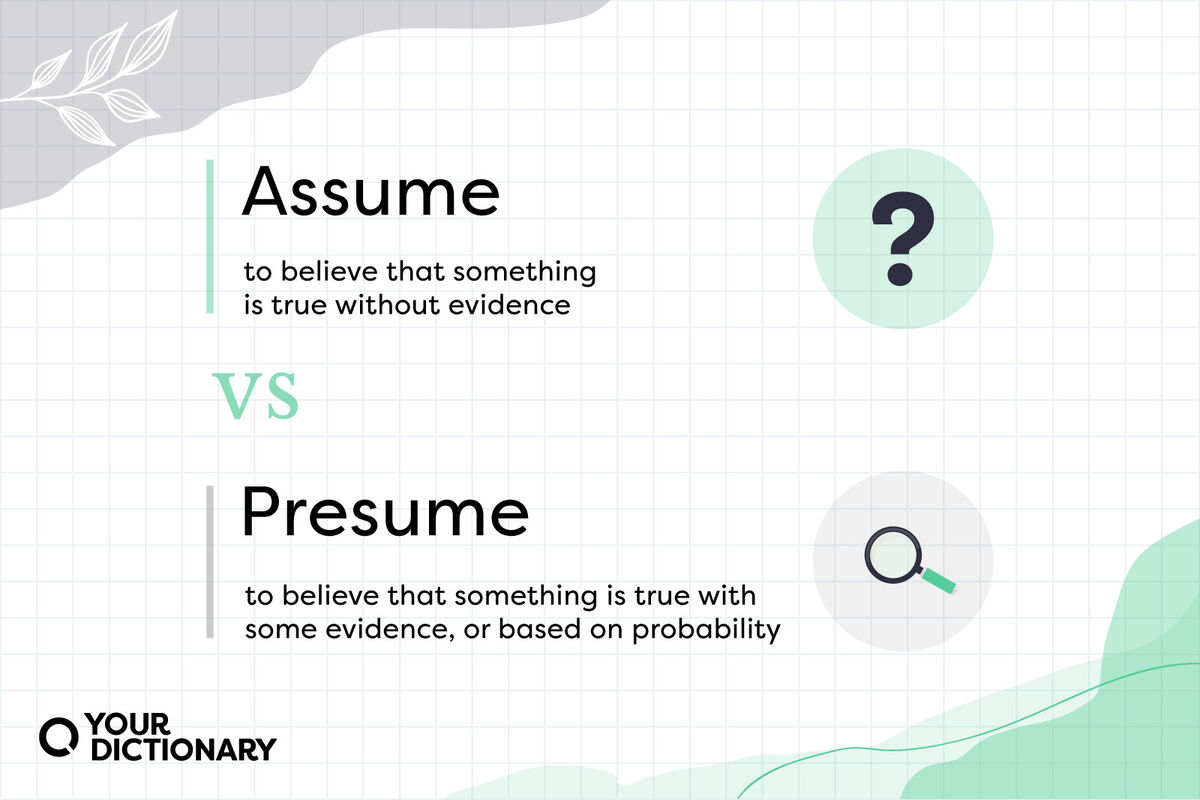
Many people believe that the words assume and presume are interchangeable. But even though these words sound similar, their meanings are different enough that they are not synonyms. Keep reading to learn the difference between presume vs assume, identify their meanings, and see each word in example sentences.
The Main Difference Between Presume And Assume
It’s easy to mix up presume and assume. They’re both verbs that describe coming to a conclusion without knowing all the facts. But check out the slight differences in their meanings:
- assume (v) - to believe that something is true without evidence
- presume (v) - to believe that something is true with some evidence, or based on probability
Additionally, they each have second meanings:
- assume (v) - to take authority or responsibility for a task
- presume (v) - to act without permission
As you can see, the first meanings are more similar than the second meanings. That’s where the error usually occurs when mixing up presume and assume.
Assumption vs. Presumption
There is some confusion around the noun version of these words as well. You make an assumption when you assume something to be true, and you make a presumption when you presume something to be true. But the difference between presumption and assumption is the same as the verb form of the word: it depends on how much information you have.
Latin Roots
Both words come from the same Latin root: sumere, which means “to take upon.” But the prefix for assume was originally ad-, which means “toward.” The prefix pre- in presume means “before.” Therefore, a person who presumes something is true may know information in advance, while a person who assumes something is true is heading toward a conclusion.
How to Use Assume
So, how do you use assume in a sentence? It depends on what you’re trying to say. Characters who jump to conclusions are assuming that they know what’s happening. Here are some examples of assume in a sentence:
- I assume that the plane will leave on time.
- For the sake of argument, let’s assume that you’re telling the truth.
- Don’t assume that you know how I feel.
- Our teacher assumed we wouldn’t look up the answers on our phone.
- Sean didn’t check his wallet, but he assumed he had enough money to pay.
Need some more examples? You can find additional sentences that use both meanings of the word assume in this article about using assume in sentences.
How to Use Presume
To use presume correctly, you’ll need to include more details in your sentence. Someone who presumes uses past knowledge or observations to come to a conclusion. However, they could still be incorrect because they don’t have all the information.
Check out these sentences that use presume:
- Based on your low-quality work, I’d presume that you did this at the last minute.
- Since you spent three years in Paris, I presume you know French quite well.
- American citizens are presumed innocent until proven guilty.
- He’s wearing a mail carrier’s uniform, so I presume he knows his way around the neighborhood.
- Ivan is very tall, so people presume he plays professional basketball.
These sentences include additional phrases or clauses that provide more information. That way, the characters make presumptions rather than assumptions. For information about using presume in a sentence, take a look at examples of sentences that use presume.
Assume vs. Presume Examples
If you still want to see assume and presume in context, try switching them out in your sentence. You’ll find that it’s quite easy to tell the difference between them when there’s enough context clues. For example:
- I assume you’re feeling sad about your trip getting cancelled.
- I presume you’re feeling sad about your trip because you were really looking forward to it.
- Janet got into an accident when she assumed the other driver would stop.
- Janet got into an accident when she saw the other driver’s brake lights and presumed he would stop.
- We assumed you’d be late.
- We presumed you’d be late because traffic is terrible.
- The detective assumed the suspect was about to tell the truth.
- The detective presumed the sobbing suspect was about to tell the truth.
- My boss assumes that I can lead this project.
- My boss presumes I can lead this project based on my education and experience.
See the difference? It works in conversation, too – you make assumptions when you have no evidence and presumptions when you have some additional details.
Commonly Confused Words
Knowing the difference between assume and presume may help people take you more seriously. After all, having some evidence can be more compelling than having no evidence at all. For more help on commonly confused words, check out these helpful worksheets and tips.